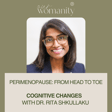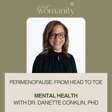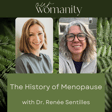
6. Perimenopause: Ear, Nose, and Throat (ENT) with Lindsay Means, CNP
Welcome back to Our Womanity! In this episode, Dr. Rachel Pope sits down with Lindsay Means, CNP, a nurse practitioner at the Ear, Nose, and Throat Institute at University Hospitals Cleveland Medical Center. They explore how perimenopause and menopause affect ENT health and the common issues women face during this time.
Lindsay Means earned her Master's in Nursing at Malone College and became a Family Nurse Practitioner in 2009. She began her career at University Hospitals in Cleveland in the department of Gyn/Oncology. She remained in that specialty until 2015, when she transferred to the ENT department, working for the division of Neurotology. She currently manages patients with a variety of ear-related issues, including dizziness.
Key Takeaways:
- Dizziness & Balance Issues: Lindsay discusses how dizziness is one of the most common complaints she sees in women during perimenopause and menopause, with a focus on vestibular migraines and balance problems.
- Understanding Vertigo: Learn the difference between vertigo (spinning sensation) and other balance issues, and why many women mistakenly associate dizziness with vertigo when they’re actually experiencing lightheadedness or unsteadiness.
- Hormonal Changes & Migraine: How perimenopausal women may experience vestibular migraines without traditional headaches, with hormonal fluctuations potentially making these symptoms worse.
- Meniere’s Disease vs. Migraine: Lindsay explains the overlap between Meniere’s disease and migraine-related ear symptoms, and the importance of proper diagnosis to avoid confusion between the two.
- Ear Health and Dryness: Perimenopausal women may experience itchy ears due to dry skin and changes in earwax production. Lindsay shares practical advice, including oil drops to alleviate symptoms.
Why You Should Listen:
This episode highlights how perimenopause and menopause impact different systems of the body that are often overlooked, such as ENT health. Lindsay’s insights into balance disorders, migraines, and ear-related issues provide valuable information for women navigating this stage of life.
Remember, you don’t have to suffer through it! Seek help if you’re experiencing these symptoms, and don’t hesitate to reach out to healthcare professionals like Lindsay who specialize in ENT and balance disorders.



















